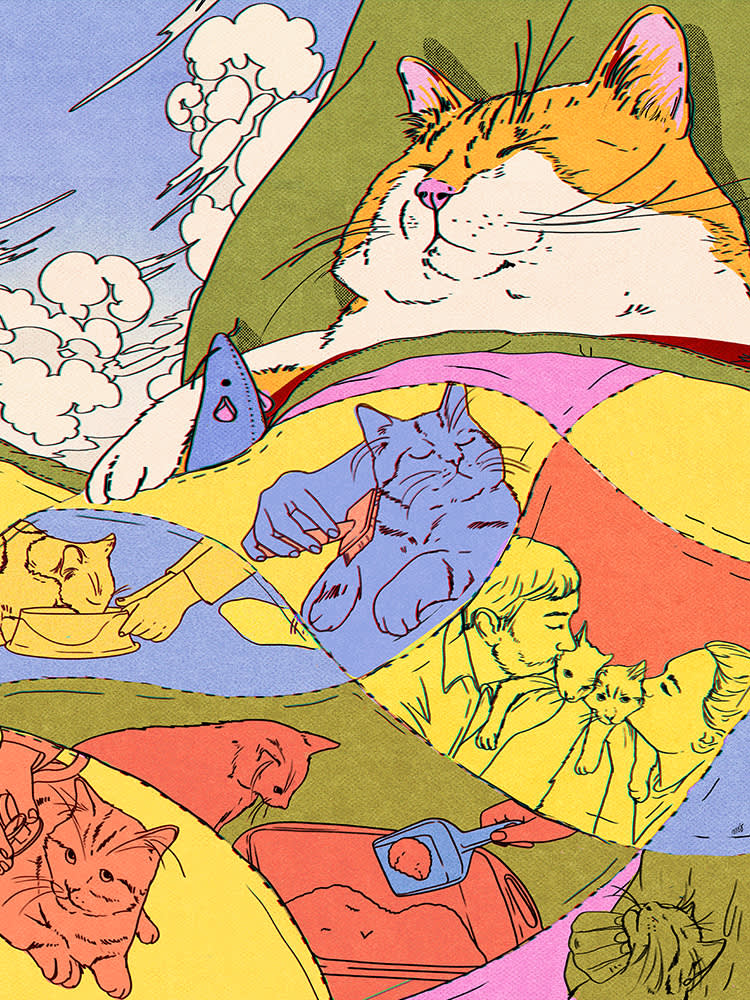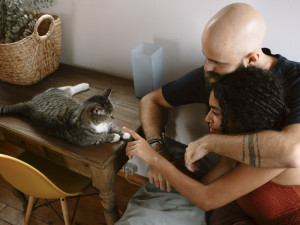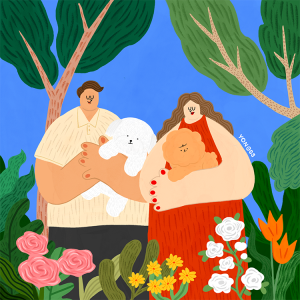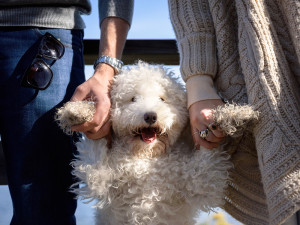
What to Do When Your Partner Isn’t Pulling Their Weight With Your Pet
So you don’t have to be annoyed anymore.

Share Article
Heavy Petting is a weekly column full of relationship advice for pet parents—so you and your boo don’t end up fighting like cats and dogs over the cat and dog.
It’s a day you’ll remember forever, a life-altering event. You’ve finally found your person, someone whose strengths fit perfectly into your fractures and vice versa. It’s the type of bond that makes all the ridiculous plots of romantic comedies seem a little less convoluted. So, naturally you decide it’s time to pop the big question. Maybe you’re on a beach somewhere or walking through a beautiful, snowy winter scene, you stop and get down on one knee. When they turn around, heart pounding, you ask them, “Will you get a pet with me?”opens in a new tab.

littleKin™ is Kinship’s home just for puppy and kitten parents. Bop over to check out expert advice, new pet tools, and special deals—all curated for your newest family member.
opens in a new tabBut no one warns you that this relationship-cementing commitment carries its own unexpected baggage. For many couples, tension can arise when the new cat or dog honeymoon phase wears off and arguments about who is responsible for what pet care begin. So, I consulted with a couple of relationship experts on how best to manage these pet parenting disputes.
The connections between parenting pets and humans
Before diving into solutions, I’d like to address any human parents out there reading this and potentially rolling their oh-so-tired eyes. Pet parenthood presents challenges not unlike human parenthood. Except that your human kid will eventually, I hope, learn to use the toilet on their own without being supervised or assisted. They will then soon be able to prepare their own food and presumably be left alone in the house for more than 15 minutes without having an emotional breakdown.
Sure, my dog is needier than most, and a lot of cats are more self-sufficient than I am, but that’s not exactly the point here. What I’m getting at is that human parents or pet parents, we are all in this struggle together. In each case, conflicts can brew as a result and negatively impact relationships long-term. But you don’t have to just take my clearly biased word for it.
“The issues surrounding pets can be quite similar to the issues surrounding parenting,” explains Amy Morinopens in a new tab, a psychotherapist and author of 13 Things Mentally Strong Couples Don’t Doopens in a new tab. “Who is going to stay home to care for the pet on the weekend? Who is going to get up in the night with a puppy? Who is going to walk the dog on a rainy day? Or scoop the litter box? Train the kitten to actually pee in the litter box? There are many responsibilities that couples have to do that require them to be uncomfortable,” she adds.
Dr. Martha Tara Leeopens in a new tab, a relationship counselor and author of Love, Sex and Everything In Betweenopens in a new tab, confirms that while the specific types and levels of responsibility between parents of pets and parents of humans are far from identical, the underlying dynamics are similar. Both situations require shared commitment and effort from each partner to ensure the well-being of the dependents involved.
But with pet parenting, it’s easy to have a disconnect between what one thinks will be expected of them and what it actually takes to care for a pet. Now, if I learned anything from recently streaming Saltburn — outside of the fact I could spend the rest of my life watching Jacob Elordi read Harry Potter shirtless — it’s that when two people enter a situation with vastly opposed expectations, the result can be quite destructive. Presumably, most people understand the weight of being a parent, but when adopting a pet, some might assume minimal responsibility. This leaves their partner to do most of the work.
Where conflict begins with pet parenting
There are a few reasons why these issues develop and this phenomenon is so common. Both Morin and Dr. Lee point to a lack of communication as a key culprit in creating the dynamic. While it might be understandable to point all of the blame at the partner who’s lacking in their pet care efforts, there is a way to avoid this: Clearly discuss the division of labor before you bring the pet home.
“Couples often underestimate the duties associated with being pet parents. And they may assume the responsibility will fall more on one partner than the other but often they don’t discuss these things,” Morin says.
For example, if one partner works from home or fewer hours overall, the expectation may be that they can handle the bulk of the pet care, but that should be clarified early on. She explains that another common situation feuding pet parents face occurs when one-half of the couple wants the animal more than the other, but the person who isn’t itching to scoop poop every day doesn’t want to disappoint their spouse.
Unfortunately, each of these scenarios likely reflects a larger unattended problem in the relationship. Per Morin, a lack of communication about who’s taking the dog for a walk probably mirrors a lack of communication in general. Adopting an animal without setting duties prior may represent a pattern of taking action without proper discussion first. In the case of one partner agreeing to become pet parents out of fear of disappointing their spouse, the couple may have a history of not speaking up or not listening when concerns are expressed.
“The underlying assumption is, ‘You can have the pet as long as I don’t have to do anything.’ But that’s usually not a realistic expectation,” Morin explains.
How to stop arguments before they start
To halt these emotional battles early or prevent them from escalating, Dr. Lee recommends addressing the division of pet responsibilities directly and clearly. By having an open and honest conversation regarding expectations and preferences, there is minimal risk of misinterpretation or misconceptions about each individual’s obligations.
“In resolving conflicts around pet care, it’s crucial to establish open lines of communication and foster a deep understanding of each other’s perspectives. By actively listening and empathizing with one another, we can find creative and mutually beneficial solutions that not only address the immediate issue but also strengthen the bond between partners,” she adds.
What to do if there’s already been a rift over pet care tasks
Ultimately, healing these wounds is a lot like asking what the best Beastie Boys album is, it always comes down to Ill Communication. So how should you approach your partner with these concerns? As tempting as it may be, it’s crucial not to open the floor in a confrontational manner. Morin recommends avoiding presenting issues or concerns as a complaint. Instead, clearly state what changes or help you’d like to see in a non-aggressive way. Rather than lamenting that the grass looks gross, ask if they’d be willing to help clean up after the dog in the backyard.
It’s also important to let your partner know how their inactivity is affecting you. “Talk about your experience. Saying, ‘I’m struggling to get up in the night multiple times,’ will lead to a better conversation than if you say, ‘You never get up with the puppy,’” Morin says. She notes that acknowledging what support you are getting or things you appreciate that your partner does will also benefit the positivity of the conversation and help make it a more productive experience.
Dr. Lee agrees that framing the conversation in a more positive light and acknowledging each other’s contributions will leave both partners feeling more motivated and empowered to carry their fair share of the workload.
“When it comes to unfulfilled pet care tasks, it’s essential to approach the situation with empathy and a focus on maintaining a healthy and cooperative environment. Instead of pointing fingers or assigning blame, let’s strive for open dialogue and constructive problem-solving,” she says.
Pet care: a game, of sorts
Now look, as a dude, I can comfortably admit that it is more often than not my fellow dudes who are lacking in their respective pet responsibility. We are, of course, not usually that bright. Thankfully, there are several strategies and tools that can help me and my contemporaries keep track of our preordained duties.
Beyond improving communication and reinforcing positive behavior, Dr. Lee suggests creating a shared calendar or chore chart to keep track of each person’s contributions. I get it: Setting up a chore chart might remind you of a time when your new year’s resolutionsopens in a new tab included “stop eating crayons,” but accountability can do wonders for productivity. Plus, it might even inspire some healthy competition.
“Let’s turn pet care into a friendly challenge where we strive to outdo ourselves in providing exceptional care for our four-legged friends,” Dr. Lee says.
And keep track of your progress
In addition to establishing a duty schedule of sorts, Morin recommends couples put aside time every week to review the progress and state of responsibilities. It’s a great way of holding each other accountable and minimizing the risk of stress building up.
“This is a good time to discuss anything from vet bills and expenses to the division of labor. Just knowing that you’re going to check in with one another can prevent a lot of tension during the week and it may help you approach the issue with a problem-solving mentality,” she says.
Morin notes to temper your own expectations, as well. Be it workload or effort, nothing is ever going to feel entirely 50/50 in a relationship so you should avoid keeping score. There are going to be times when you need to step up and do more, just as there will be moments when you need the most help. You and your partner are a team, and both of your actions should reflect that.
As Dr. Lee puts it, “By working together, we can ensure the happiness and health of our beloved companions. Let’s set aside any differences and focus on the common goal of creating a loving and nurturing environment for our pets.”

Sean Zucker
Sean Zucker is a writer whose work has been featured in Points In Case, The Daily Drunk, Posty, and WellWell. He has an adopted Pit Bull named Banshee whose work has been featured on the kitchen floor and whose behavioral issues rival his own.



